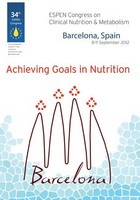
Whether or not there should be mandatory fortification of folic acid across Europe has been a topic of hot debate for some time, with regulatory agencies across the bloc pondering the idea of introducing national guidelines for fortification of foods with the pro-vitamin.
The topic received another boost into the limelight at the recent 34th ESPEN Congress and Nutrition and Metabolism in Barcelona, where Rima Obeid from the University of Saarland, Germany, presented a review of the current evidence mandatory fortification of folic acid.
“Is folic acid good for everybody?” Obeid questioned. “Yes!” she said. “Providing it is within the safe range.”
Speaking at the congress, Obeid explained that folates from food support the methylation or proteins and aids DNA synthesis. For this reason she claims that folate is at the ‘epicentre’ of modern nutrigenetic research.
“Folate is required especially at times when cells are growing and dividing. This is particularly important during pregnancy and early foetal development.”
“Folic acid lowers neural tube defects by up to 70%, depending on the baseline risk,” said the expert. “From this perspective folic acid fortification can meet the requirements of pregnant people, and also aid genetic polymorphisms, and it can improve folate status in elderly people.”
However she noted that folates have also been implicated in the growth and development of cancer tumours.
Folate or folic acid?
Obeid explained that while folates play an important role in the body, it is folic acid – a synthetic form of the nutrients – which is generally used for fortification.
She noted that folic acid has several advantages over natural folates found in food, in that it is more stable and very cheap to produce. This is the main reason why it is used for the fortification of vitamin supplements, she added.
The benefits of folate for neural tube defects are the main reason to discuss the fortification of foods with folic acid on a population level, said Obeid. However she questioned whether food folates could be better than folic acid?
Obeid suggested that 5-methyl-THF (MTHF), which is the dominant dietary form of folate found in foods, could be a better solution to folic acid fortification because this is the natural form of folate that is utilised during early development.
“We think that this is the form that should indeed be supplemented for pregnant women,” said Obeid, who did note that challenges of stability need to be faced.
Too much of a good thing?
Obeid said that whilst some data has suggested that high intakes of folic acid can accelerate the development of cancer, there is very little evidence to suggest any causal effect between data suggesting the incidence of certain cancers increased in the USA after folic acid fortification was introduced.
“Studies have shown that in the four years after fortification began in the USA there was an increase in colon cancer – this was a small increase that was not shown to be causal,”
“At the same time there were increases in cancer detection, and more people were smoking and became overweight, so there is no evidence of causality or that this increase is in any way related to folic acid fortification.”
The expert also noted that the majority of people reaching the upper recommended limits for folate intake have something in common in that they all use additional supplementation whilst consuming fortified foods.
“The amount you add to food is calculated by working out what the population is normally consuming on average. So this is why the added amounts are different between countries,” she said.
She argued that it also has been shown that the folate cycle is extremely well buffered by homocystine – meaning that if you consume too much folate then the risk of any damaging effects remains low.
“So you cannot imagine that a system in which if you give a lot of folate then you will develop cancer. This is not the case.”
Good for everybody?
“It is [also] important to know that many people in Europe, have genetic modifications in their folate cycle that affect their requirement for folate.”
For example, she said that between 12% and 20% of European people has a genetic mutation that results in a much higher need for folic acid.
“They have higher requirements just to reach a normal metabolic level.”
“I think the question should be, is folic acid good for everybody,” she said. “I think I would say yes, if it is within the recommended range.”
“But we should avoid vitamin B12 deficiency and I would recommend that it would be better in terms of supplementation to supplement with 5-methyl-THF than folic acid.”





